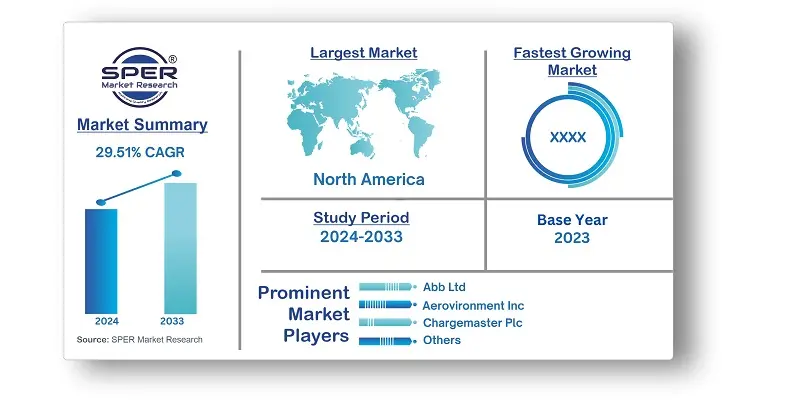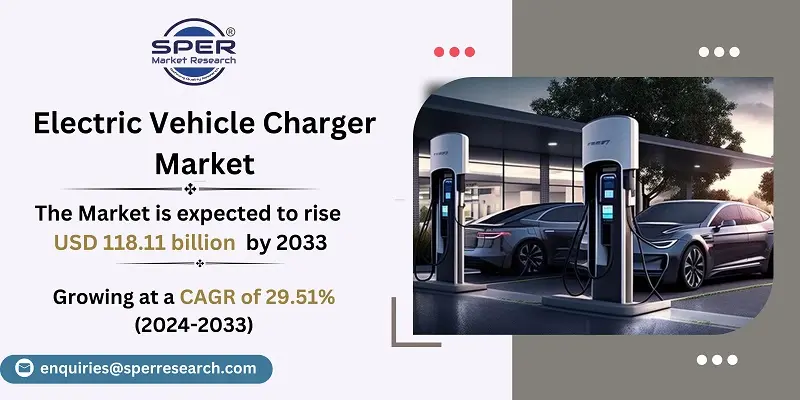
Electric Vehicle Charger Market Growth, Size, Trends, Demand, Share, Revenue and Future Outlook
Electric Vehicle Charger Market Size- By Vehicle Type, By End User, By Charging Type- Regional Outlook, Competitive Strategies and Segment Forecast to 2033
| Published: May-2024 | Report ID: AMIN24133 | Pages: 1 - 211 | Formats*: |
| Category : Automotive & Transportation | |||
- January 2023; In South Carolina, ABB increased the volume of EV chargers it produced. This allows charging developers, owners, and operators to quickly deploy dependable chargers by drastically cutting lead times and delivery costs for DC fast chargers in the US.
- April 2023; In an effort to speed up the electrification of corporate fleets, ChargePoint Holdings Inc. and ALD Automotive inked a deal to launch a new EV charging business in Europe. The solution offers drivers access to over 485,000 charging ports via a unified charging card and app.


| Report Metric | Details |
| Market size available for years | 2020-2033 |
| Base year considered | 2023 |
| Forecast period | 2024-2033 |
| Segments covered | By Vehicle Type, By End User, By Charging Type |
| Regions covered | North America, Asia-Pacific, Latin America, Middle East & Africa and Europe |
| Companies Covered | Abb Ltd., Aerovironment Inc., Chargemaster Plc, Chroma Ate, Delphi Automotive, Pod Point, Robert Bosch Gmbh, Schaffner Holdings Ag, Silicon Laboratories, Siemens Ag and Others. |
- EV Owners
- Automotive Manufacturers
- Fleet Operators
- Residential Property Owners
- Commercial Property Owners
- Public Charging Network Providers
- Municipalities and Governments
- Utility Companies
- Real Estate Developers
| By Vehicle Type: |
|
| By End User: |
|
| By Charging Type: |
|
- Global Electric Vehicle Charger Market Size (FY’2024-FY’2033)
- Overview of Global Electric Vehicle Charger Market
- Segmentation of Global Electric Vehicle Charger Market By Vehicle Type (Battery Electric Vehicle (BEV), Plug-in Hybrid Electric Vehicle (PHEV), Hybrid Electric Vehicle (HEV))
- Segmentation of Global Electric Vehicle Charger Market By End User (Residential, Commercial)
- Segmentation of Global Electric Vehicle Charger Market By Charging Type (On-board Chargers, Off-board Chargers)
- Statistical Snap of Global Electric Vehicle Charger Market
- Expansion Analysis of Global Electric Vehicle Charger Market
- Problems and Obstacles in Global Electric Vehicle Charger Market
- Competitive Landscape in the Global Electric Vehicle Charger Market
- Impact of COVID-19 and Demonetization on Global Electric Vehicle Charger Market
- Details on Current Investment in Global Electric Vehicle Charger Market
- Competitive Analysis of Global Electric Vehicle Charger Market
- Prominent Players in the Global Electric Vehicle Charger Market
- SWOT Analysis of Global Electric Vehicle Charger Market
- Global Electric Vehicle Charger Market Future Outlook and Projections (FY’2024-FY’2033)
- Recommendations from Analyst
1.1. Scope of the report1.2. Market segment analysis
2.1. Research data source2.1.1. Secondary Data2.1.2. Primary Data2.1.3. SPER’s internal database2.1.4. Premium insight from KOL’s2.2. Market size estimation2.2.1. Top-down and Bottom-up approach2.3. Data triangulation
4.1. Driver, Restraint, Opportunity and Challenges analysis4.1.1. Drivers4.1.2. Restraints4.1.3. Opportunities4.1.4. Challenges4.2. COVID-19 Impacts of the Global Electric Vehicle Charger Market.
5.1. SWOT Analysis5.1.1. Strengths5.1.2. Weaknesses5.1.3. Opportunities5.1.4. Threats5.2. PESTEL Analysis5.2.1. Political Landscape5.2.2. Economic Landscape5.2.3. Social Landscape5.2.4. Technological Landscape5.2.5. Environmental Landscape5.2.6. Legal Landscape5.3. PORTER’s Five Forces5.3.1. Bargaining power of suppliers5.3.2. Bargaining power of buyers5.3.3. Threat of Substitute5.3.4. Threat of new entrant5.3.5. Competitive rivalry5.4. Heat Map Analysis
6.1. Global Electric Vehicle Charger Market Manufacturing Base Distribution, Sales Area, Product Type6.2. Mergers & Acquisitions, Partnerships, Product Launch, and Collaboration in Global Electric Vehicle Charger Market
7.1. Global Electric Vehicle Charger Market Size, Share and Forecast, By Vehicle Type, 2020-20267.2. Global Electric Vehicle Charger Market Size, Share and Forecast, By Vehicle Type, 2027-20337.3. Battery Electric Vehicle (BEV)7.4. Plug-in Hybrid Electric Vehicle (PHEV)7.5. Hybrid Electric Vehicle (HEV)
8.1. Global Electric Vehicle Charger Market Size, Share and Forecast, By End User, 2020-20268.2. Global Electric Vehicle Charger Market Size, Share and Forecast, By End User, 2027-20338.3. Residential8.4. Commercial
9.1. Global Electric Vehicle Charger Market Size, Share and Forecast, By Charging Type, 2020-20269.2. Global Electric Vehicle Charger Market Size, Share and Forecast, By Charging Type, 2027-20339.3. On-board Chargers9.4. Off-board Chargers
10.1. Global Electric Vehicle Charger Market Size and Market Share
11.1. Global Electric Vehicle Charger Market Size and Market Share By Region (2020-2026)11.2. Global Electric Vehicle Charger Market Size and Market Share By Region (2027-2033)11.3. Asia-Pacific11.3.1. Australia11.3.2. China11.3.3. India11.3.4. Japan11.3.5. South Korea11.3.6. Rest of Asia-Pacific11.4. Europe11.4.1. France11.4.2. Germany11.4.3. Italy11.4.4. Spain11.4.5. United Kingdom11.4.6. Rest of Europe11.5. Middle East and Africa11.5.1. Kingdom of Saudi Arabia11.5.2. United Arab Emirates11.5.3. Qatar11.5.4. South Africa11.5.5. Egypt11.5.6. Morocco11.5.7. Nigeria11.5.8. Rest of Middle-East and Africa11.6. North America11.6.1. Canada11.6.2. Mexico11.6.3. United States11.7. Latin America11.7.1. Argentina11.7.2. Brazil
11.7.3. Rest of Latin America
12.1. ABB LTD.12.1.1. Company details12.1.2. Financial outlook12.1.3. Product summary12.1.4. Recent developments12.2. AEROVIRONMENT INC.12.2.1. Company details12.2.2. Financial outlook12.2.3. Product summary12.2.4. Recent developments12.3. CHARGEMASTER PLC12.3.1. Company details12.3.2. Financial outlook12.3.3. Product summary12.3.4. Recent developments12.4. CHROMA ATE12.4.1. Company details12.4.2. Financial outlook12.4.3. Product summary12.4.4. Recent developments12.5. DELPHI AUTOMOTIVE12.5.1. Company details12.5.2. Financial outlook12.5.3. Product summary12.5.4. Recent developments12.6. POD POINT12.6.1. Company details12.6.2. Financial outlook12.6.3. Product summary12.6.4. Recent developments12.7. ROBERT BOSCH GMBH12.7.1. Company details12.7.2. Financial outlook12.7.3. Product summary12.7.4. Recent developments12.8. SCHAFFNER HOLDINGS AG12.8.1. Company details12.8.2. Financial outlook12.8.3. Product summary12.8.4. Recent developments12.9. SILICON LABORATORIES12.9.1. Company details12.9.2. Financial outlook12.9.3. Product summary12.9.4. Recent developments12.10. SIEMENS AG12.10.1. Company details12.10.2. Financial outlook12.10.3. Product summary12.10.4. Recent developments12.11. Others
SPER Market Research’s methodology uses great emphasis on primary research to ensure that the market intelligence insights are up to date, reliable and accurate. Primary interviews are done with players involved in each phase of a supply chain to analyze the market forecasting. The secondary research method is used to help you fully understand how the future markets and the spending patterns look likes.
The report is based on in-depth qualitative and quantitative analysis of the Product Market. The quantitative analysis involves the application of various projection and sampling techniques. The qualitative analysis involves primary interviews, surveys, and vendor briefings. The data gathered as a result of these processes are validated through experts opinion. Our research methodology entails an ideal mixture of primary and secondary initiatives.



Frequently Asked Questions About This Report
PLACE AN ORDER
Year End Discount
Sample Report
Pre-Purchase Inquiry
NEED CUSTOMIZATION?
Request CustomizationCALL OR EMAIL US
100% Secure Payment






Related Reports
Our Global Clients
Our data-driven insights have influenced the strategy of 200+ reputed companies across the globe.




















